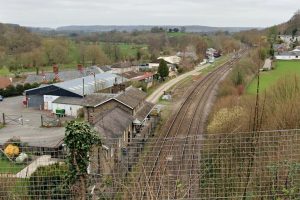THE TOWERING 80ft high memorial at Carmarthen to war hero and slave colony governor Sir Thomas Picton will not be demolished, removed or renamed – but information boards telling his story in full will be erected. The decision was made by the Plaid Cymru led Carmarthenshire County Council’s Executive Board today after they’d heard that a substantial majority of the 2,500 people who replied to a public consultation favoured keeping the monument at its present location. Cllr Cefin Campell, Chair of the cross-party group tasked with holding the consultation, said that more must be done to fully educate people about the life and times of colonial era people like Thomas Picton, and that information boards placed in prominent positions near the monument and elsewhere is a step towards achieving that aim.
“The fact that almost 2,500 people responded to our questionnaire justifies our decision to ask the people of Carmarthenshire for their opinion on the future of this historical landmark and associated street names, in view of the worldwide attention given to statues of people with known links to slavery,” said Cllr Cefin Campbell, Chair of the cross-party Task and Finish group which held the public consultation.
“Our result clearly shows that a majority were in favour of keeping the monument, as it commemorates a war hero who fell in the great battle against Napoleon at Waterloo. But others felt that commemorating a cruel slave owner who permitted legalised atrocities against black people when he was Governor of Trinidad was totally unacceptable.

Given the level of opinion, and the fact that respondents on both sides of the debate felt that more should be done to fully educate people about Sir Thomas Picton and other historical figures, it was unanimously decided that information boards be prominently placed near the monument and in the vicinity of the former courtroom in the Guildhall where his portrait hangs. The Group believed we all have a responsibility for how historical figures are understood and remembered and how their history is presented, especially for future generations. The provision of information boards is a step towards achieving this aim.”
Cllr Gareth John, who took part in the consultation as Mayor of Carmarthen, pointed out that the monument debate is just part of the County Council’s wider approach to addressing racism and discrimination in the society.
“Whilst others focused on the clamour to remove public monuments, Carmarthenshire County Council are formulating a wide-reaching set of policy actions to address all the issues surrounding discrimination and inequality within our society, which included racism and the appropriateness of monuments and memorials such as the one to Thomas Picton.
“It really saddened me at the time this consultation began that the main topic of discussion centred around the future of the Picton monument. Regretfully, this was fuelled by certain individuals spreading the false information that the council had already decided that the monument should be removed, which resulted in opinion becoming very polarized extremely quickly, with many becoming totally intolerant of any debate.”
“Picton’s appalling role and actions in the Trinidad sugar slave colony must be weighed against his subsequent military career and death as a war hero, laid to rest in St Paul’s Cathedral. The original memorial in Carmarthen was paid for by local public subscription and as Mayor I’m glad that the recommendations being made reflect the views of the present residents of our town.”
“Removing or demolishing the massive Picton monument would have been out of the question – not to mention hugely expensive,” said Cllr Alun Lenny, who represents Carmarthen Town South and is a local historian. “Iconoclasm, being the destruction of monuments for political or religious purposes, is just sweeping history under the carpet. Renaming or rededicating it to someone else, no matter how worthy, would be disingenuous. It was erected by the people of Carmarthen in a past age for a specific purpose. It is a visible historical edifice which speaks eloquently about the values of our ancestors, both good and bad. However, since most contemporary values and attitudes differ to theirs, we, the people of Carmarthen today, must tell Sir Thomas Picton’s story in the round.
“General Picton was a product of the British colonial era, of which conquest, slavery and the looting of other countries were central elements. That dark story, and his part in it, must be told. But Picton was also a brave man, as demonstrated by his heroic conduct during the hour of his death at Waterloo, a battle which changed the course of European history.”
The Council have confirmed to The Carmarthenshire Herald that the Picton monument issue is just one element of a far-reaching inquiry to address racism and discrimination in Carmarthenshire by the Task and Finish group, which was set up following a Notice of Motion to full council last July by Plaid Cymru members. The cross-party group will take evidence and ensure that the concerns and suggestions of black and ethnic communities are fully heard in order to inform future policy. Amongst a raft of other measures, the council agreed to work with schools to include such themes as colonialism and exploitation in the new National Curriculum, encourage more members of the BAME community to apply for posts on the County Council, and work with the police on addressing racism and discrimination within the judicial system.














Add Comment